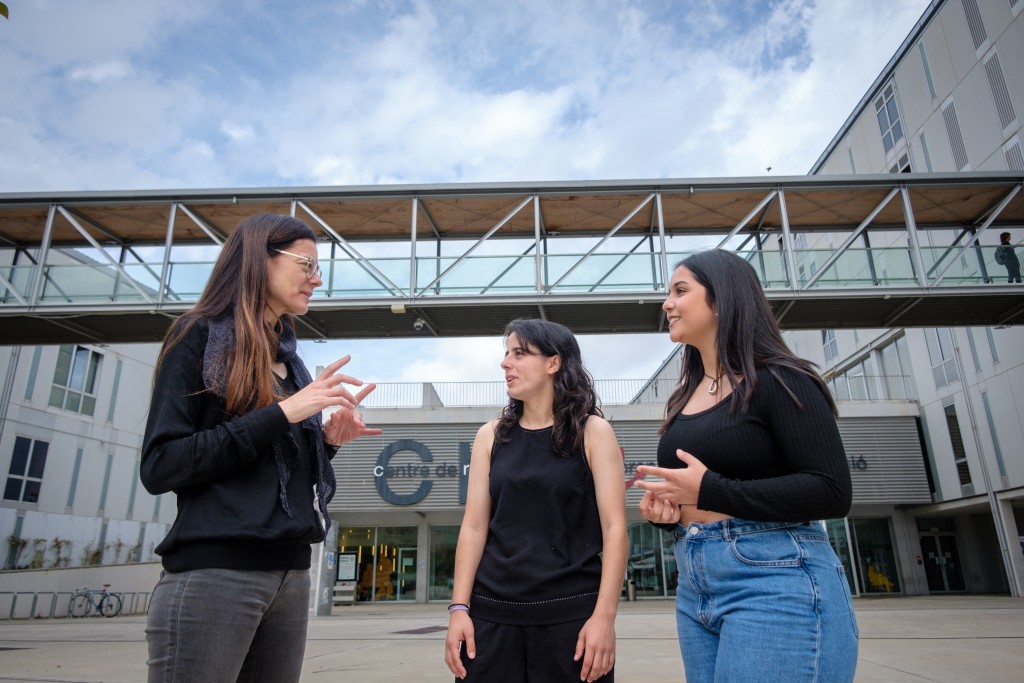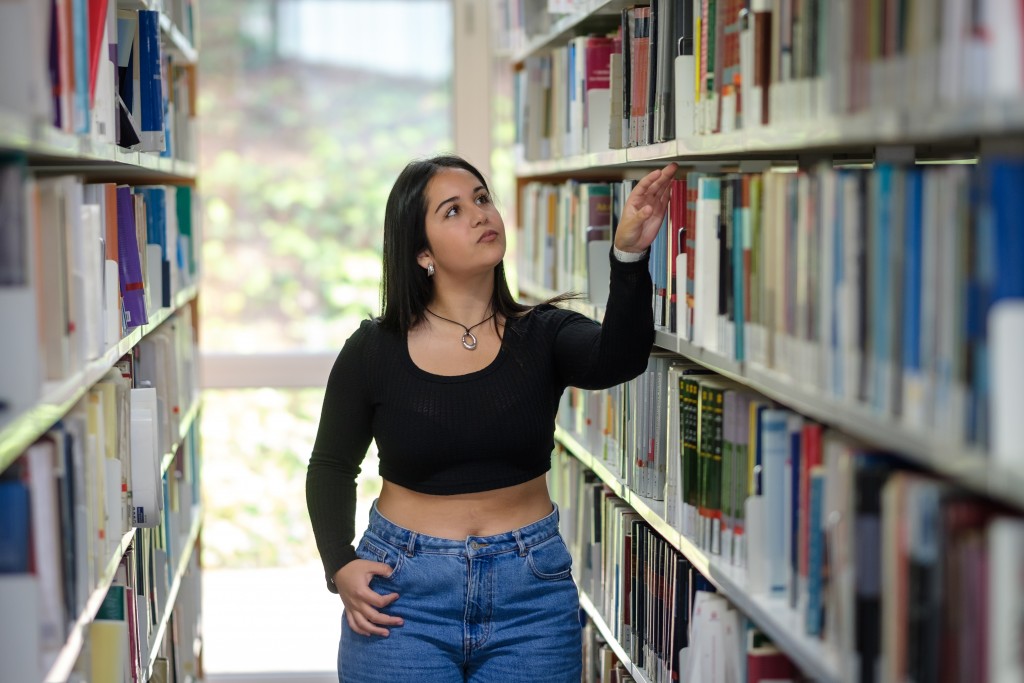Press notes 06/06/2024
A pioneering initiative to change the lives of students who are former wards of the state
The URV’s Amb-Èxit-Ed programme is the first set up by a Catalan university to help this group, who give particular value to funding, support and information

The URV’s Amb-Èxit-Ed programme is the first set up by a Catalan university to help this group, who give particular value to funding, support and information
“I wouldn’t move from here now. I have support and someone to turn to for any questions I may have. I feel that people are behind me.” Studying at the Universitat Rovira i Virgili was not an idea that Laura Frau had entertained, because after secondary school she wanted a change of scene, but an information session shortly before she finished upper secondary education changed her mind. In a foster family since the age of 8, Laura is just one of the wards of the state that the information session targeted. It was given by the researchers from the URV’s Department of Pedagogy Carme García Yeste and Regina Gairal. Thanks to them, she learned everything that the Amb-Èxit-Ed programme has to offer. The programme is the first of its kind to be organised by a Catalan university, it receives the support of the Department of Social Rights of the Catalan Government and it has been implemented for the first time on a pilot basis this academic year 2023-24.
The aim of the programme is to make university attractive to boys and girls who are wards of the state, even though prejudice has often meant that they have been kept away from and poorly informed about higher education opportunities. Once they have started their university course, they are also provided with financial aid, largely so that they can have lunch on campus and purchase the material they need for internships, and they are told about the administrative procedures and the services on offer. Laura is one of five first-year students to have joined the programme. Officially she is a former ward as the government ceases to provide protection at the age of 18 and she is very happy with her choice of the URV and with how her first year of Pedagogy is going. But she is particularly happy with the support she is being given and the fact that she now has someone to turn to (the programme has given her the names of reference lecturers) if she has any doubts or problems. “They make sure I get all the information and take care of me, but without being too much on top of me, which I also appreciate,” she says.
In fact, Carme Garcia Yeste, who designed the programme by taking a similar one from the University of the Basque Country as her inspiration, considers that the pilot course is going very well. She points out that, although the funding awarded to the students is important, the key is information: “The main problem is that wards of the state do not know what advantages they have: for example, every public university reserves one place on each degree course for them and they can study at the Official School of Languages at no cost. When a new law is passed, the people for whom it is designed have great difficulties in finding out about it. And they have lots of problems with the administrative procedures, which are by no means straightforward, applying for scholarships and so on. And they can only hope that what happened to Olga doesn’t happen to them.”
Olga Sánchez has lived with a host family since she was very young, but was not able to join the programme because she was already on a second-year course at university (second year). However, she was key in the preparation. As Garcia Yeste points out, she was a victim of this lack of information that the programme aims to alleviate. “I study Physiotherapy, and first of all I enrolled at EUSES, a private institution in Tortosa affiliated to the URV because I didn’t know that, as a student, there was a place for me at the public university,” she says. And she adds that she was able to do the second year at the URV thanks to the help she was given by the members of staff.
A necessary helping hand
Thus, the experience of Olga and others was key to identifying the needs of the wards and it helped Carme Garcia Yeste and Regina Gairal to design the programme. “We asked them to tell us what they would have liked to have when they were first admitted to the university. For example, everyone agreed that the food allowance is basic. So, the programme was based above all on their proposals, since they are the ones who really what they need,” adds Garcia Yeste. Olga also takes part in the information sessions talks and lends a hand in some procedures, such as applying for scholarships, a subject in which she claims to be an expert. “If my experience enables other people to afford to go to university, great. University is not easy for anyone, but at the very least wards of the state should not have more trouble than everyone else. They should have the same opportunities,” says Olga.
In short, Laura Frau’s circumstances have enabled her to enjoy university life and the degree in Pedagogy on her path to social education. Her vocation has been developing because her personal situation has given her an understanding of the importance and need of the profession: “It is an essential job.” When Laura turned 18, she preferred to stay with her host family, as she felt quite at home and did not want to be alone. “But I pay for everything – shopping, clothes, driving lessons – with the loan given to wards who are no longer under guardianship,” she points out.

The age of 18 is a crucial moment for wards of the state because they have to make vital decisions. “Because they are still really very young but they are told that they have to fend for themselves. It is especially problematical for those who have been in institutions, because so many things have to be explained to them that often there is no time to talk to them about university. Otherwise, it would be too overwhelming. We always tell the people in charge of these institutions that they consider university as a possibility for them. And once they are admitted, we will use the programme to ensure that they are taken care of. If anything can change their lives, it’s the university,” she says. Importantly, like Olga, Laura has the support of the host family, but wards who have always been in institutions and are moved to supervised apartments at the age of 18 need more support, since they are in an environment that is not conducive to study. For them, the URV programme is even more valuable.
As far as prejudices are concerned, Olga insists that they should not be made to believe, as they are often are, that they are not good enough to study: “The fact that we come from complicated backgrounds does not mean that we do not have a place at university, that we do not have a promising future.” Laura, for example, is more than satisfied with the world that has opened up for her and with the fact that she has now far exceeded her expectations. It is clear that at some point in the future she will take part in the mentoring programme, also part of the plan, to help new university students.
Carme Garcia Yeste is already thinking about next year now that the pilot project has finished on a high note. In fact, the information session for next year has already been given to the wards of the state at the local secondary schools, some of whom have already contacted her so she is optimistic that the ten first-year places available will be filled and the programme already has funding for the next four years. She will also ensure that all wards or ex-wards of the state who are in the first year are aware of the programme, whether they have been admitted on the strength of their entrance exam grade or whether they have been assigned one of the reserved places. However, even if all the places are not filled, the programme is designed to be flexible and adapt to any changes that may occur: for example, if one of the students wants to go on an Erasmus exchange or do a professional master’s degree. What is more, if everything goes as planned, the five students involved in the pilot year will move up to the second year.
The programme, therefore, will grow year after year and will help to remove the obstacles in the way of these people so that they have the same opportunities as other young people. As Garcia Yeste says, “There is nothing more normalising than education.”
